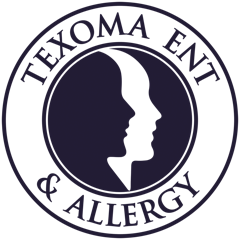At Texoma ENT & Allergy, we receive a wide variety of questions from patients about ear, nose, and throat health. From concerns about hearing loss to treatment for allergies, understanding the basics of ENT care can help you make informed decisions about your health. Below, we’ve answered some of the most frequently asked questions to help guide your journey to better health.
1. What is the difference between an ear infection and swimmer’s ear?
An ear infection and swimmer’s ear are both conditions that affect the ear, but are caused by different factors. An ear infection typically affects the middle ear and is caused by bacteria or viruses. Swimmer’s ear, on the other hand, is an outer ear canal infection caused by water exposure and bacteria. While both conditions can cause pain and discomfort, swimmer’s ear can often be prevented by keeping your ears dry. To learn more about Swimmer’s ear check out this blog article.
2. How do I know if I need a hearing aid or a cochlear implant?
Hearing loss can range from mild to severe, and the best solution depends on the degree of hearing loss. Hearing aids are typically effective for people with mild to moderate hearing loss, while cochlear implants are recommended for individuals with severe or profound hearing loss. At Texoma ENT & Allergy, our specialists can help you determine the most appropriate treatment option based on your individual needs.
3. What are the symptoms of chronic sinusitis?
Chronic sinusitis can cause persistent facial pain, nasal congestion, headaches, and thick nasal discharge. These symptoms may last for months, making it essential to seek treatment. Our ENT specialists offer advanced diagnostic tools and treatment options, such as sinus surgery and medications, to help manage chronic sinusitis effectively.
4. What is the best way to manage seasonal allergies?
Seasonal allergies can cause a variety of uncomfortable symptoms, including sneezing, itchy eyes, and nasal congestion. The most effective way to manage allergies is through allergy testing and personalized treatment plans, which may include antihistamines, nasal sprays, or immunotherapy. Texoma ENT & Allergy offers comprehensive allergy services to help alleviate symptoms and improve your quality of life.
5. Can sleep apnea be treated without a CPAP machine?
While CPAP machines are the most common treatment for sleep apnea, they are not the only option. For those who find CPAP therapy uncomfortable, alternative treatments, such as Inspire therapy, can help treat obstructive sleep apnea without the need for a mask. Our specialists can assess your condition and recommend the best treatment plan for you.
Are you experiencing symptoms that may require professional ENT care? Don’t wait until your issues worsen. Our expert team at Texoma ENT & Allergy is ready to answer your questions and provide personalized treatment options to improve your health and well-being.Contact us today to schedule an appointment.





